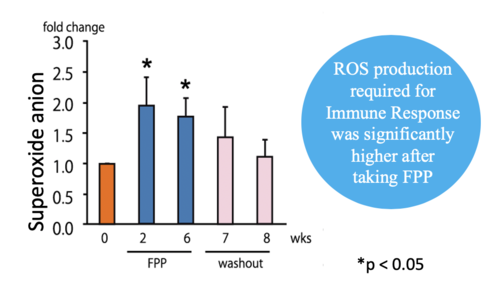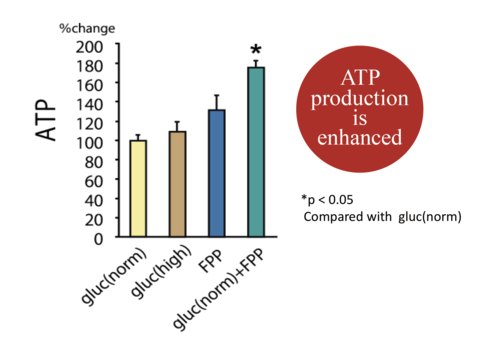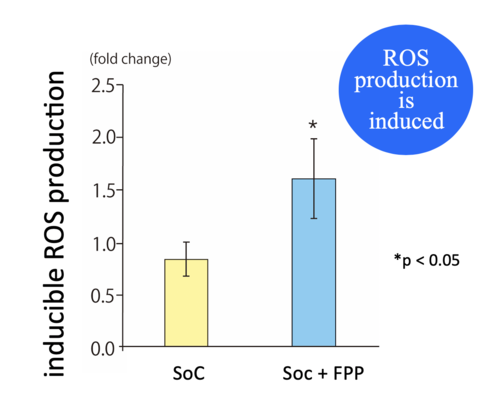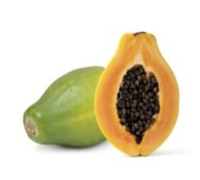News&Topics
Information
2020/02/19InformationResearch Results
May FPP help prevent infectious disease?
"What Clinical Studies on FPP are Teaching Us"
Every year, there are growing interests in preventing infectious diseases during flu season. In addition, concern over the unpredictable coronavirus epidemic has led to an increased interest in infectious disease prevention and we have a lot of inquiries this year. Thus, we would like to introduce some related clinical studies on FPP on the theme of "What clinical studies on FPP are teaching us" in order to provide useful information to take effective preventive measures.
|
Our Saliva in the mouth provides a first line of defense against pathogens (virus or bacteria etc.) that can infect mucous membranes of the mouth, throat and nose, however, the foreign enemies such as virus or bacteria can enter the body when our immunity is low. We will explain the effect of FPP on salivary IgA. |
Increasing Salivary IgA leads to
protect the body from infectious diseases!
The study population consisted of 90 sedentary healthy patients, divided into three groups: 20-40 years; 41-65 years; over 65 years. Subjects were supplemented for 1 month with either 9g/day (4.5g twice a day sublingually) of FPP or placebo. After a further month period of wash out, subjects were treated again in a crossover manner. Salivary secretion was significantly increased by FPP supplementation only in the youngest age-group. Subjects treated with FPP showed a significantly higher level of IgA and lysozyme production, irrespective of age group, while their baseline production was significantly lower in the oldest age-group as compared to the youngest one. FPP treatment brought about a significant upregulation of all phase II enzyme and SOD gene expression tested in nasal lavage cells. 1)
< Salivary IgA Secretion : Effect of FPP Supplementation in different age groups >
FPP supplementation resulted in higher salivary IgA, bearing important roles on the oral immunity (defense against respiratory diseases), regardless of age
Red bar︓FPP supplemented group Yellow bar︓Placebo supplemented group ★p<0.05
1) Click here for more details.
Diabetic patients tend to cause ulcers from even small foot wounds, eventually leading to leg amputation due to necrosis in certain cases. This happens because their weakened immune system cannot fight against pathogens for wound healing, which is a huge risk for infectious diseases. It is very important to keep immune system strong to avoid infection.
|
FPP is proven to have immune boosting effect for diabetic patients by a series of studies. |
Boosting immune system of diabetic patients who have high risk for infection
upregulates the power against infectious diseases!
We supplemented FPP(9g/day, 6 weeks) orally to 22 Type II Diabetic (T2D) patients, followed by 2-week washout period, to investigated the safety on the hyperglycemia status of these patients and its effect on immune function. The result showed that FPP did not influence blood parameters of T2D patients, suggesting FPP can be safely consumed by T2D patients even though FPP have a high sugar content. It is also confirmed that ROS (superoxide anion) production was significantly higher after FPP supplementation, showing FPP may improve immune response of TD2 patients. 2)
In order to investigate this mechanism, we observed ATP level in human monocytic THP-1 cell that were cultured in glucose media supplemented with FPP compared with a glucose alone group, suggesting that FPP may enhance ATP generation in monocytes. In addition, FPP induced NADPH production and elevated mitochondrial membrane potential and O2 consumption in monocytes, suggesting that FPP enhances energy metabolism in mitochondria. 2)
2) Click here for more details.
In other clinical study, it was confirmed that FPP improved wound healing of T2D patients. It is raising expectation for reducing risk of infection-related complications of T2D patients.
In other clinical study with T2D patients receiving chronic wound treatment, it was confirmed that the inducible production of reactive oxygen species (ROS) was significantly higher in wound-site immune cells from patients supplemented with FPP and on standard of care (SoC) for wound management compared with those patients receiving SoC alone. It is raising expectation for reducing risk of infection-related complications of T2D patients.3)
3) Click here for more details.
Because of the series of Diabetic studies,
FPP has been patented as "ATP Production Promoter, Mitochondrial Activity Promoter, and Immunostimulant" in JAPAN
Patent No. 6401792
Patented on September 14, 2018
Click here to download the PDF file
【Reference】
1) Is there a potential application of a fermented nutraceutical in acute respiratory illnesses? An in-vivo placebo-controlled, cross-over clinical study in different age groups of healthy subjects J Biol Regul Homeost Agents. 2012 Apr-Jun;26(2):285-94
2) Does oral supplementation of a fermented papaya preparation correct respiratory burst function of innate immune cells in Type 2 diabetes mellitus patients? Antioxid Redox Signal. 2015; 22: 339-345.
3) May Dietary Supplementation Augment Respiratory Burst in Wound-Site Inflammatory Cells? Antioxid Redox Signal. 2018 Feb 10;28(5):401-405.






